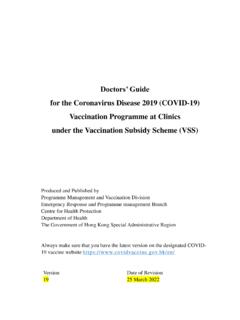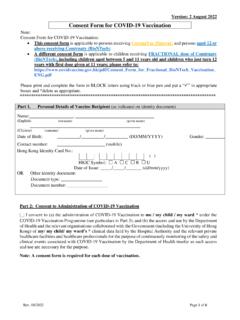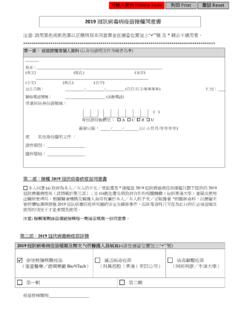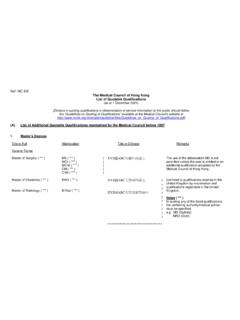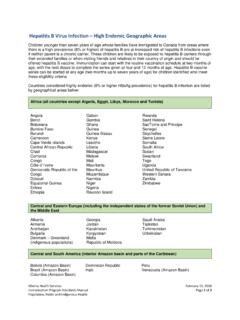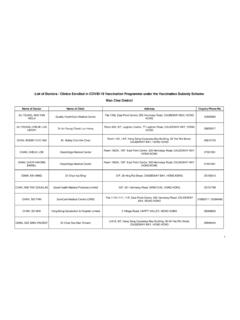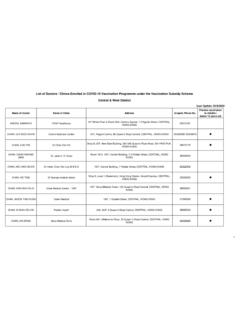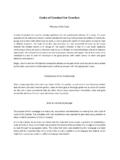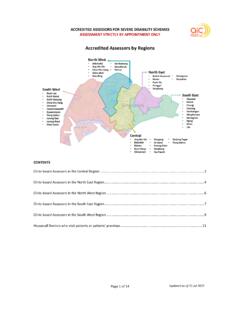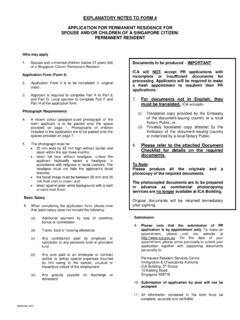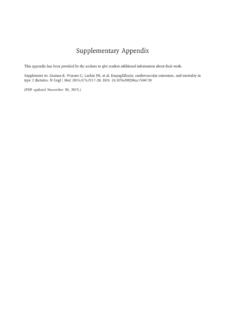Transcription of Frequently Asked Questions on COVID-19 Vaccination for ...
1 1 1) Why should children and adolescents aged 3 to 17 years receive COVID-19 vaccine? In the early stage of the COVID-19 epidemic, the infection rate among children was relatively low. However, with the global pandemic of COVID-19 infection, overseas data show that the infection rate of children and adolescents is constantly rising. Under the spreading threat posed by mutant virus strains, children and adolescents who are yet to receive Vaccination should get vaccinated as early as possible for self-protection. Vaccination is crucial to protect children and adolescents against COVID-19 disease to effectively decrease the rates of serious illness and death. Vaccination enables children and adolescents to resume normal school and daily life as soon as possible.
2 According to the recommendation of the Joint Scientific Committees joined by the Chief Executive s expert advisory panel (JSC-EAP), children and adolescents aged 5 to 17 years could choose to receive either BioNTech(Comirnaty) vaccine or Sinovac(CoronaVac) vaccine. Children aged 3 to 4 years can receive Sinovac vaccine. 2) How many doses of COVID-19 Vaccination do children and adolescents aged 3 to 17 years need? For Sinovac vaccine as primary series For BioNTech vaccine as primary series: After completion of the first two doses, those recommended to receive additional dose(s) may choose to receive the same brand or another brand of vaccine. 2 Emerging data suggest that two doses of BioNTech vaccine with a longer interval would result in better immune response, and the risk of myocarditis and/or pericarditis would be lowered.
3 In view of the situation of COVID-19 in hong kong and overseas practice, JSC-EAP recommended two doses of BioNTech vaccine at 8 weeks ( 56 days) interval for children and adolescents aged 5 to 17 years. For children and adolescents with special needs ( study abroad) who choose to advance the second dose to after 21 days from their first dose, they need to bring along a signed parent/guardian consent form, and must be accompanied by their parent or guardian in person to the Vaccination venue on the day of Vaccination by walk-in. Children and adolescents are recommended by experts to receive BioNTech vaccine intramuscularly at anterolateral aspect of mid-thigh, although their preference for an injection at upper arm would be respected.
4 They can wear loose-fitting, easy to roll-up or other suitable clothing for ease of Vaccination . Immunocompromised persons below 18 years old have to bring the signed parent/ guardian consent form and the doctor s letter, and be accompanied by their parent or guardian in person to the Vaccination venue on the day of Vaccination . For details of the specific groups of immunocompromised patients, please refer to the thematic website FAQ 34 ( ). For eligible children between 3 and 11 years old who cannot make online bookings ( children who are not holding hong kong Identity Card or hong kong Birth Certificate, recovered children, children who received COVID-19 vaccine outside hong kong , etc.)
5 , they can bring along the completed consent forms and be accompanied by an adult to go to the CVCs (except the ones run by private hospital) at the recommended Vaccination interval according to experts' advice. CVC staff will reserve small amount of daily quota for their Vaccination . 3) Is there any difference in the ingredients and dosage of COVID-19 vaccine for children and adolescents aged 3 to 17 years and adults? Sinovac vaccine: There is no difference in the ingredient and dosage for children and adolescents aged 3 to 17 years and adults. BioNTech vaccine: There is no difference in the ingredient and dosage for children and adolescents aged 12 to 17 years and that for adults. The dosage for children aged 5 to 11 years is one-third of a dose for adults, but the ingredient is the same as that for adults.
6 If children received one-third of an adult dose of BioNTech vaccine as the 1st dose and then turned 12 years old by the time of the 2nd dose, they should continue to receive one-third of an adult dose of BioNTech vaccine for the 2nd dose. However, their parent/ guardian can also choose to receive the full dose for the 2nd dose for their children. If children aged 12 years or below received one-third of an adult dose of BioNTech vaccine as the 2nd dose, they can choose to receive either one-third of an adult dose or 3 a full dose as their 3rd dose as long as they have reached 12 years old but not yet reached 13 years old. If they have reached 13 years old already and choose BioNTech vaccine, a full dose of BioNTech vaccine for adult should be given.
7 4) Is COVID-19 vaccine safe and effective for children and adolescents aged 3 to 17 years? Phase I and II trials on the use of Sinovac vaccine in children and adolescents aged 3 to 17 years showed that Sinovac vaccine is immunogenic, safe and well-tolerated. In addition, ongoing phase III trials also showed that Sinovac vaccine was well-tolerated in this age group. Available information from mass Vaccination campaigns in mainland China among children and adolescents 3 to 17 years old (with over 210 million doses of Sinovac vaccine administered) has not shown major safety issues. BioNTech vaccine has been assessed by experts and considered safe and effective. The JSC-EAP opined that both vaccines are expected to lower the risk of severe disease or death.
8 In order to prevent outbreaks in schools, vaccinated children and adolescents should continue to observe personal hygiene and various control measures after returning to schools. 5) What are the possible side effects of COVID-19 vaccine for children and adolescents aged 3 to 17 years? Sinovac vaccine: Most side effects for those aged 3 to 17 years are mild. The most common reaction after Sinovac Vaccination is injection site pain. Other common side effects Injection site induration and swelling, fever, abnormal skin and mucous membrane, decreased appetite, nausea, headache, cough, fatigue, rhinorrhea and oropharyngeal pain Uncommon side effects Injection site pruritus and erythema, hypersensitivity, diarrhoea, vomiting, myalgia, laryngeal pain, pharyngeal erythema, upper respiratory tract infection, abdominal pain, upper abdominal pain, abdominal distention, dizziness, lymphadenitis, chest discomfort and blepharitis BioNTech vaccine: The overall safety profile of BioNTech in adolescents 12 to 15 years of age is similar to that in those 16 years old or above.
9 Very common side effects Injection site pain and swelling; tiredness, headache, muscle pain, chills, joint pain, diarrhoea, fever (Some of these side effects were slightly more frequent in adolescents 12 to 15 years than in adults) Common side effects Injection site redness, nausea and vomiting 4 Uncommon adverse effects Enlarged lymph nodes, feeling unwell, arm pain, insomnia, injection site itching, allergic reactions ( rash, itching), feeling weak or lack of energy/sleepy, decreased appetite, excessive sweating and night sweats Myocarditis and pericarditis are known adverse reactions of BioNTech, and the majority of cases occur after the second dose in adolescents. Adolescents should avoid strenuous exercise for one week after BioNTech Vaccination .
10 6) Can children and adolescents aged 3 to 17 years receive COVID-19 Vaccination if he / she has received / will receive another vaccine recently? Making reference to overseas practice and recommendation of the World Health Organisation, experts had no objection to exercising flexibility by allowing provision of COVID-19 vaccines with seasonal influenza vaccine or other childhood immunisation vaccines on the same visit for Vaccination under informed consent for administrative convenience and achieving better coverage. 7) For children and adolescents who acquired COVID-19 infection before, how many doses of COVID-19 vaccine should they receive after recovery?
